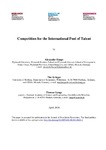Competition for the International Pool of Talent
| dc.contributor.author | Haupt, Alexander | |
| dc.contributor.author | Krieger, T | |
| dc.contributor.author | Lange, T | |
| dc.date.accessioned | 2016-06-23T17:02:33Z | |
| dc.date.issued | 2016-06-11 | |
| dc.identifier.issn | 0933-1433 | |
| dc.identifier.issn | 1432-1475 | |
| dc.identifier.uri | http://hdl.handle.net/10026.1/4958 | |
| dc.description.abstract |
Developed countries increasingly compete for a pool of talented students from developing countries. This competition induces host countries to vertically di§erentiate their education programmes: some countries supply a higher educational quality and charge higher tuition fees, while others provide a lower quality for lower tuition fees. This paper argues that the educational quality of high-quality countries, the national tuition fees and the quality and tuition fee di§erentials between the countries all increase as the income prospects for graduates in the developing countries catch up with the developed world and the number of international students grows. If foreign students become more likely to stay in their host country after graduation, the implications will be more ambiguous. In particular, an increase in educational quality can be accompanied by a decline in tuition fees. IntensiÖed competition for international students does not necessarily disadvantage developing countries, since they might even beneÖt from a brain gain. | |
| dc.format.extent | 1113-1154 | |
| dc.language | en | |
| dc.language.iso | en | |
| dc.publisher | Springer Science and Business Media LLC | |
| dc.subject | Higher education | |
| dc.subject | Student mobility | |
| dc.subject | Vertical quality differentiation | |
| dc.subject | Return migration | |
| dc.subject | Brain gain | |
| dc.title | Competition for the International Pool of Talent | |
| dc.type | journal-article | |
| dc.type | Journal Article | |
| plymouth.author-url | https://www.webofscience.com/api/gateway?GWVersion=2&SrcApp=PARTNER_APP&SrcAuth=LinksAMR&KeyUT=WOS:000380271300006&DestLinkType=FullRecord&DestApp=ALL_WOS&UsrCustomerID=11bb513d99f797142bcfeffcc58ea008 | |
| plymouth.issue | 4 | |
| plymouth.volume | 29 | |
| plymouth.publication-status | Published | |
| plymouth.journal | Journal of Population Economics | |
| dc.identifier.doi | 10.1007/s00148-016-0601-4 | |
| plymouth.organisational-group | /Plymouth | |
| plymouth.organisational-group | /Plymouth/Admin Group - REF | |
| plymouth.organisational-group | /Plymouth/Admin Group - REF/REF Admin Group - FoAH | |
| plymouth.organisational-group | /Plymouth/Faculty of Arts, Humanities and Business | |
| plymouth.organisational-group | /Plymouth/Faculty of Arts, Humanities and Business/Plymouth Business School | |
| plymouth.organisational-group | /Plymouth/REF 2021 Researchers by UoA | |
| plymouth.organisational-group | /Plymouth/REF 2021 Researchers by UoA/UoA17 Business and Management Studies | |
| plymouth.organisational-group | /Plymouth/Users by role | |
| plymouth.organisational-group | /Plymouth/Users by role/Academics | |
| dcterms.dateAccepted | 2016-05-10 | |
| dc.rights.embargodate | 2017-6-11 | |
| dc.identifier.eissn | 1432-1475 | |
| dc.rights.embargoperiod | 12 months | |
| rioxxterms.versionofrecord | 10.1007/s00148-016-0601-4 | |
| rioxxterms.licenseref.uri | http://www.rioxx.net/licenses/under-embargo-all-rights-reserved | |
| rioxxterms.licenseref.startdate | 2016-06-11 | |
| rioxxterms.type | Journal Article/Review |


